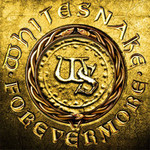Forevermore
Studio Album by Whitesnake released in 2011Forevermore review
David Coverdale is responsible for the whole Whitesnake
Three years after the release of the fantastic album Good To Be Bad (2008), the lineup of the band that made it, Whitesnake, was left by thee members, half the group. Had it not been Whitesnake, it would have been quite a puzzle, making us wonder why they could have left such a promising project. But Whitesnake is a ensemble that in thirty years has changed everything it could, beginning with the stage images, continuing with the music style and finishing with the lineup, the band’s most unstable unit. The only person to have never left it is David Coverdale, credited with the formation of this classic outfit. Solo projects are not well accustomed in hard rock, which forces David to disguise his solo activity as an actual band. What do we care while they deliver a worthy music? Whitesnake music is found worthy by all kinds of rock supporters, whether they like striking hard rock, melodious blues or heart breaking ballads. Although Whitesnake have a new lineup practically every time they get down to a new album, their music style is strictly preserved under the control of David the Boss himself. Therefore, this is him who is going to be responsible for Whitesnake’s new album Forevermore, released in 2011.
Forevermore in section: hard rock, rock and roll and blues
Whitesnake’s recent works follow one distinguished line: Coverdale is trying hard to avoid associations with the albums of the band’s golden ear, the mid eighties. Their previous effort, Good To Be Bad, proved to be much heavier and more aggressive than those records, while Forevermore appears, on the contrary, to unveil a more elegant, melodic trait of the Whitesnake character. Nevertheless, the albums kicks off the only way that is acceptable in hard rock, loud, desperate and outrageous. Having all these attributes, the opening Steal Your Heart Away secures itself a spot in the band’s concert set for the near future. Other tracks of the same nature, I Need You (Shine A Light), Love And Treat Me Right, and particularly wild My Evil Ways, are scattered all over the album for their energy to be dispersed across the CD. The blues and hard rock balance, characteristic of Whitesnake, is broken here in the benefit of the latter thank to solid riffs and precise solos. In between such drive-laden pieces there are sweet ballads like Fare The Well, Easier Said Than Done, One Of These Days, and hectic rock and roll numbers borrowing their melodic nature from blues, All Out Of Luck, Whipping Boy Blues. Forevermore is closed by the eponymous semi-ballad with acoustic intro mounting to the outburst of electric guitar.
Whitesnake prevail over time
David Coverdale has changed nothing in his lyrics and keeps writing unsophisticated lines about love and its sad outcomes. What is changed and what is reassuring is his vocals, a bit better and a bit more emotional. This is especially nice if you consider the chord injury he suffered while touring with Judas Priest. On the whole, Forevermore may walk with its head held high into the rich Whitesnake discography to find its deserved place there. The new record is far from revolutionary, which is ok as it has a completely different mission. When a band is more than thirty what you want need most of all is the proof to its studio activity. Whitesnake do not look senile or fading at all. The band keep recording albums relying on the good supply of their own works. Classic sounding of there songs is a pleasure to both old and young Whitesnake fans to whom Forevermore is another reason to rejoice with their favorite ensemble.

